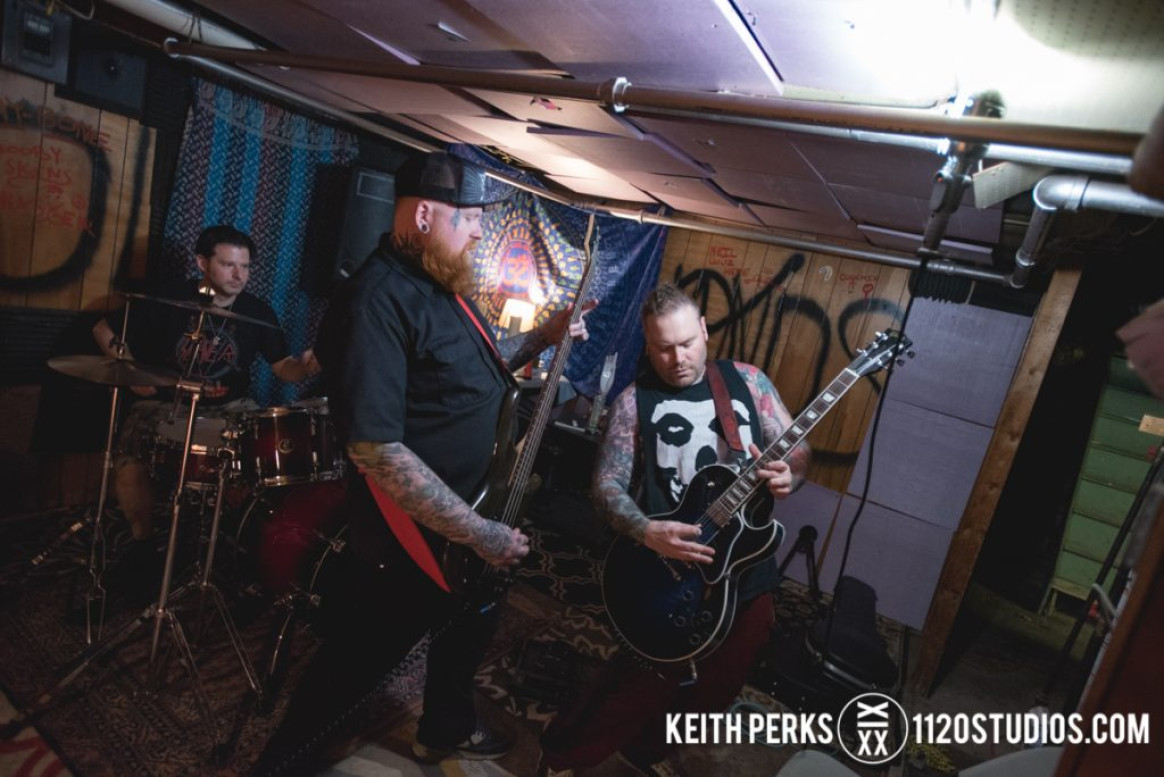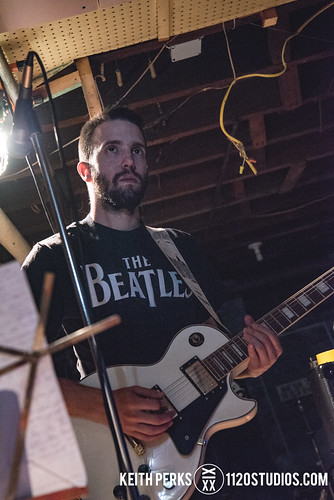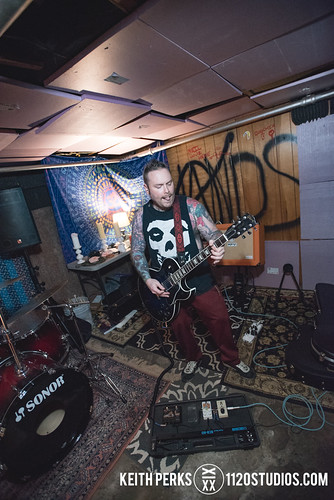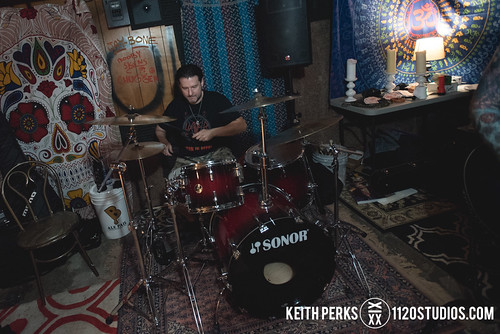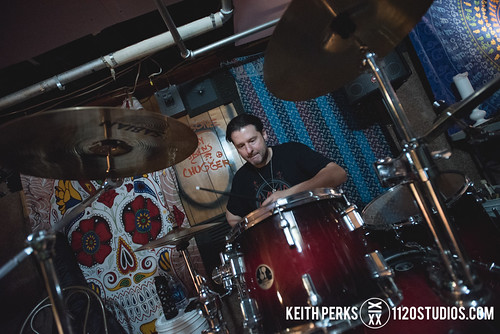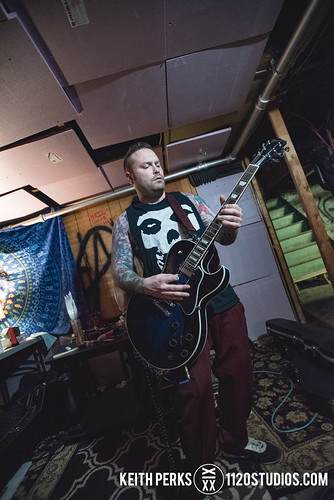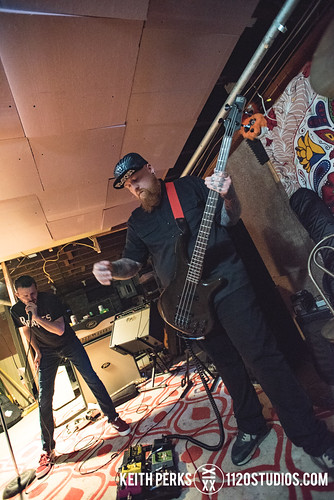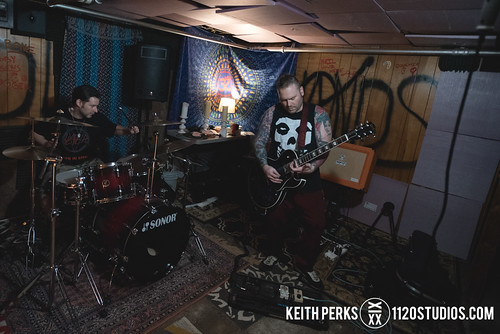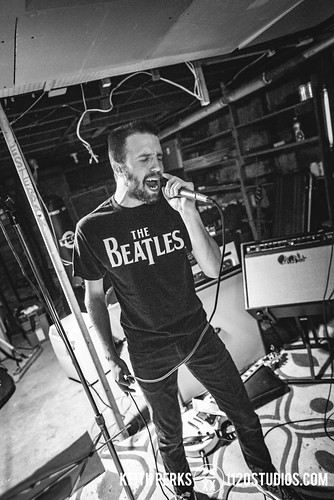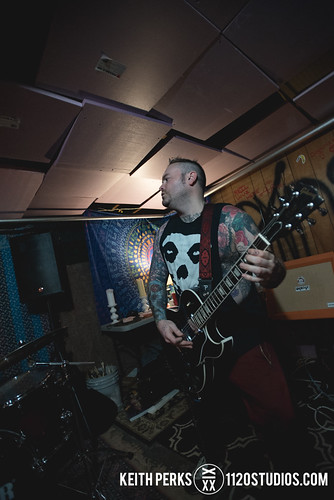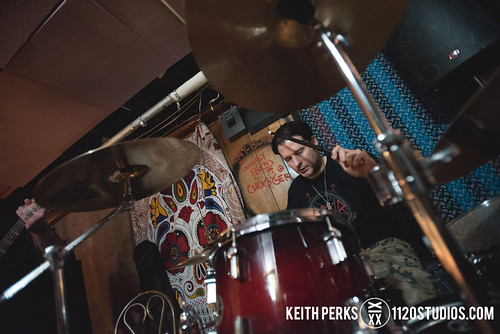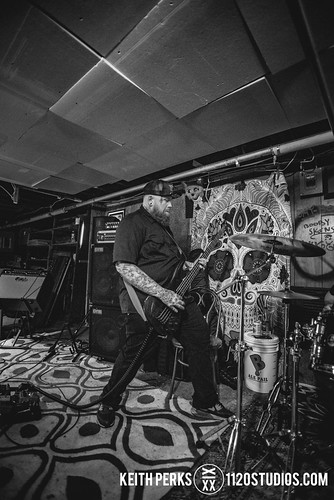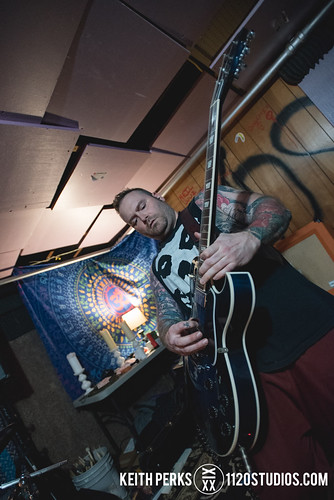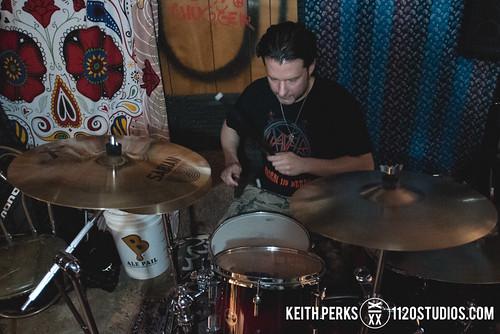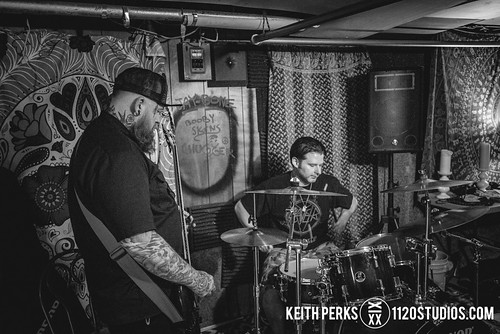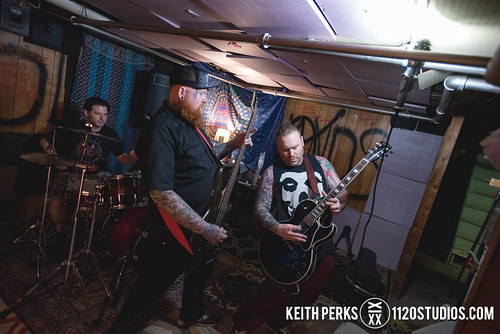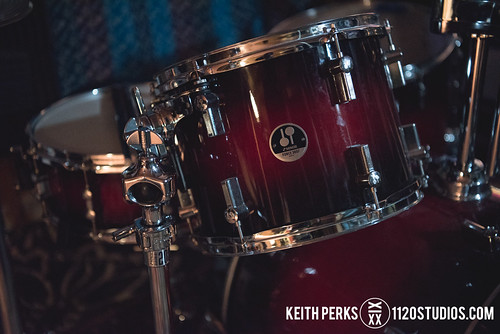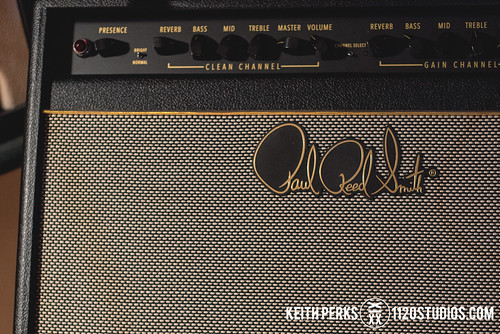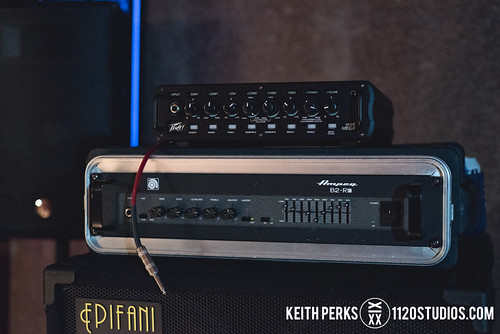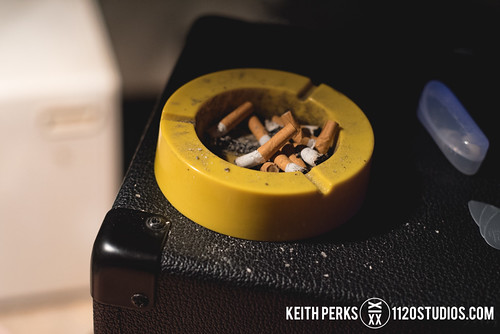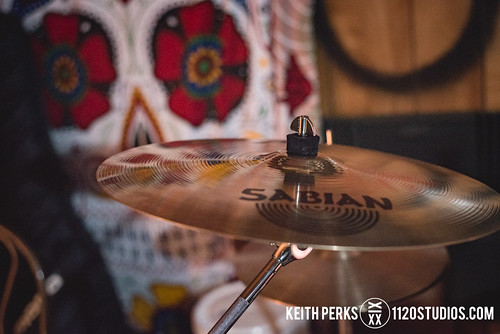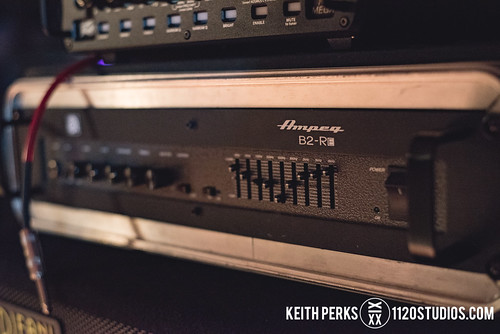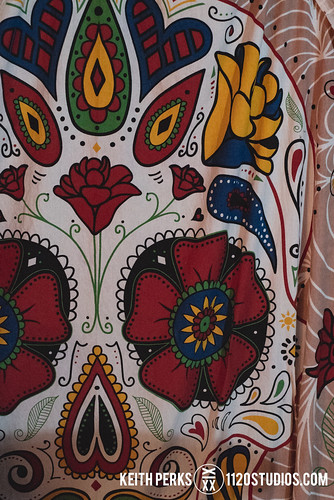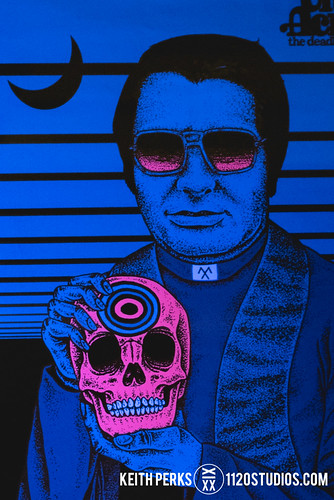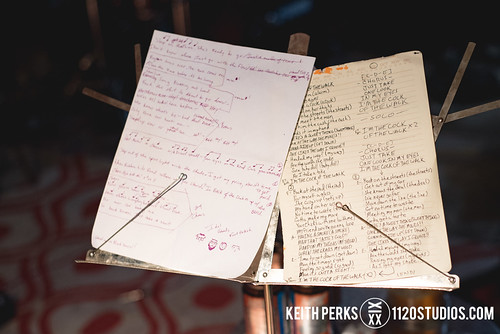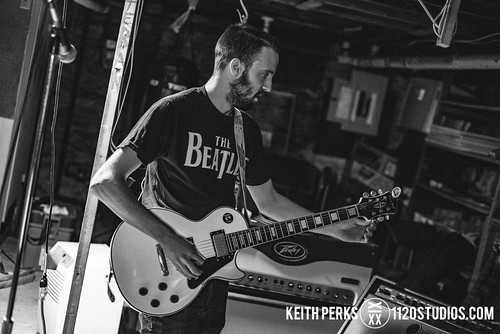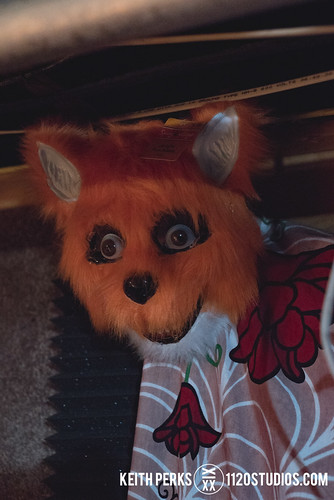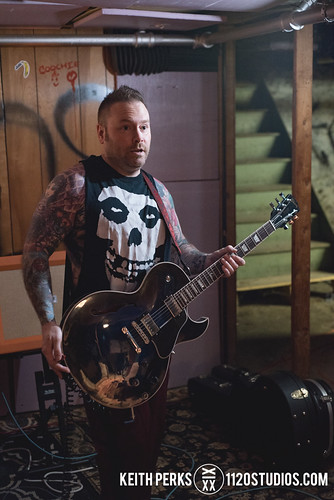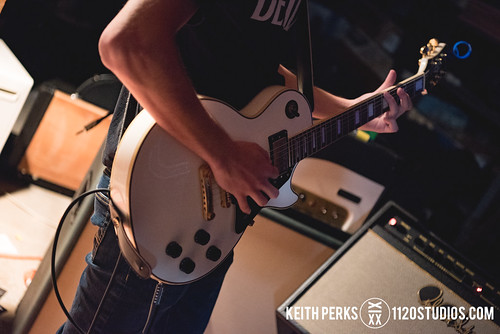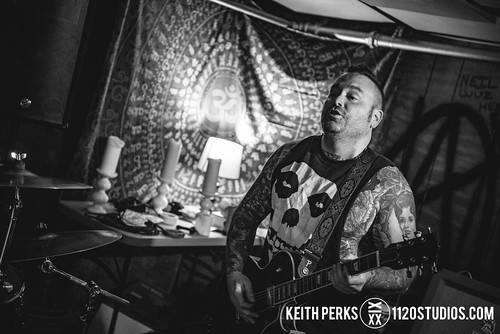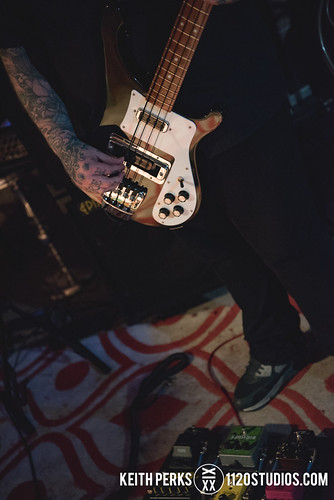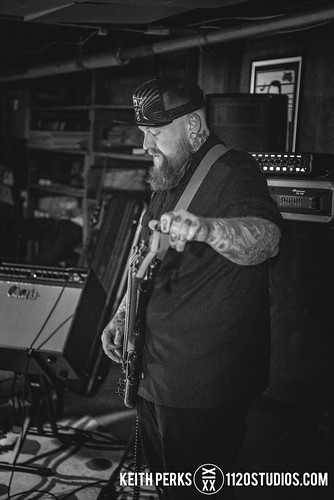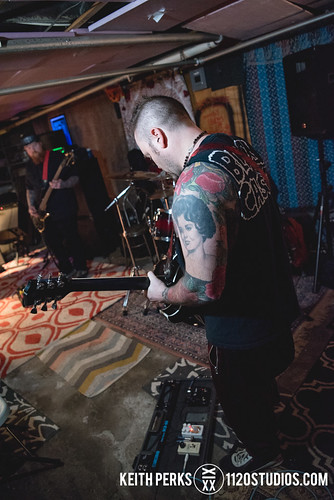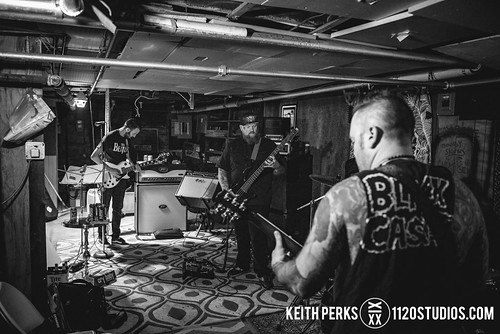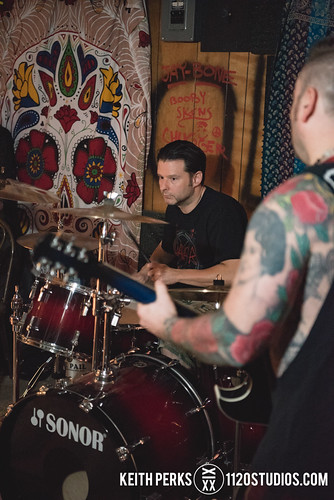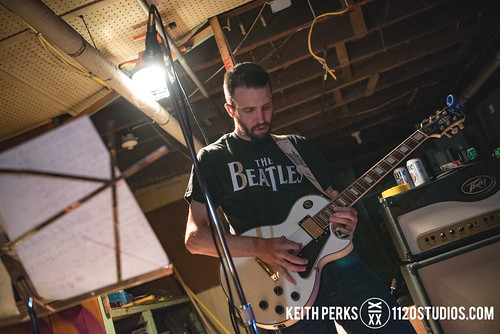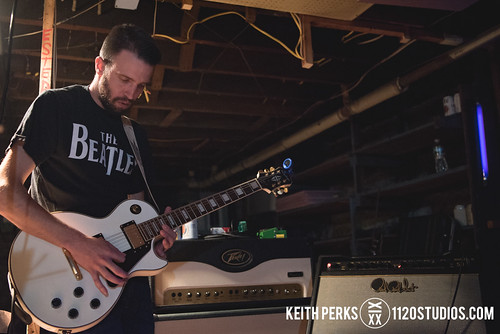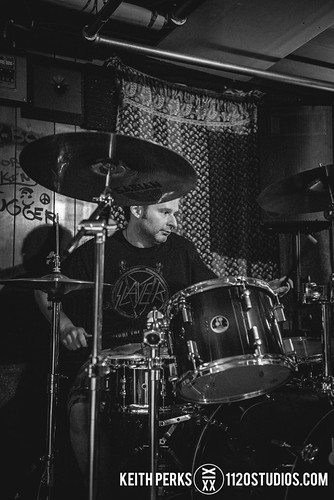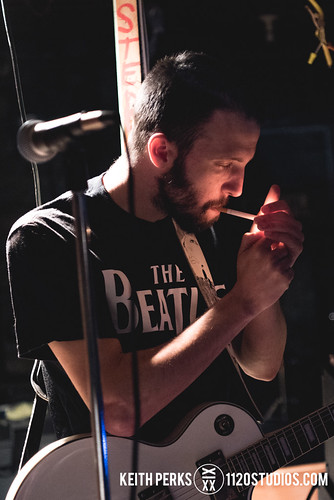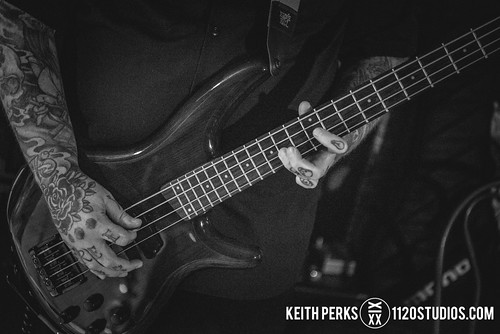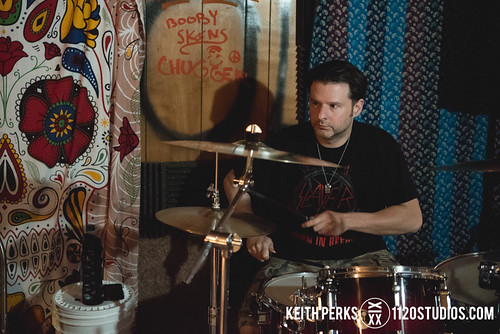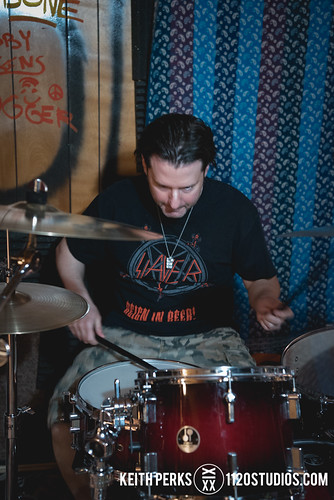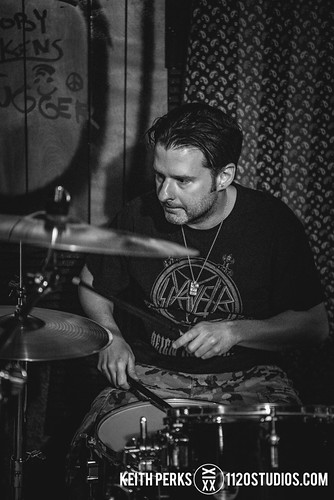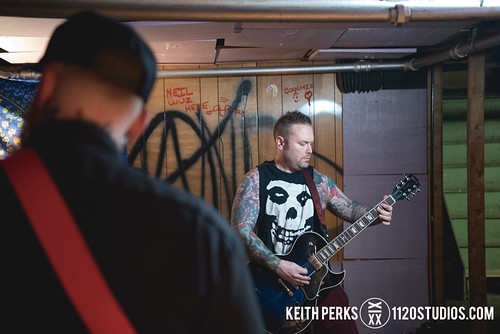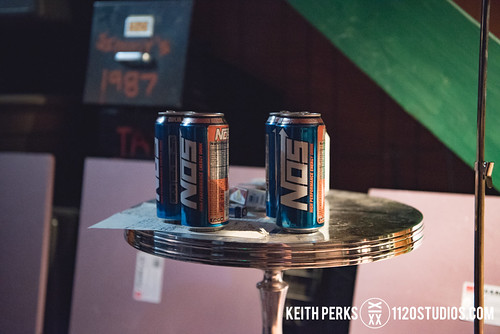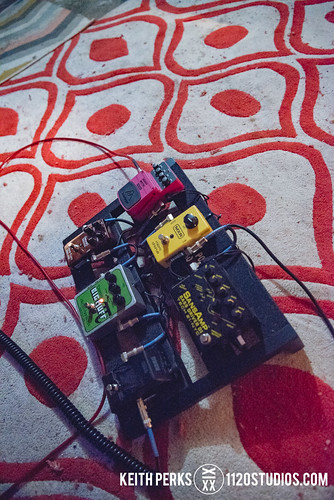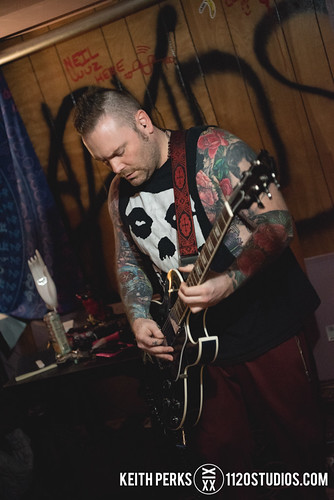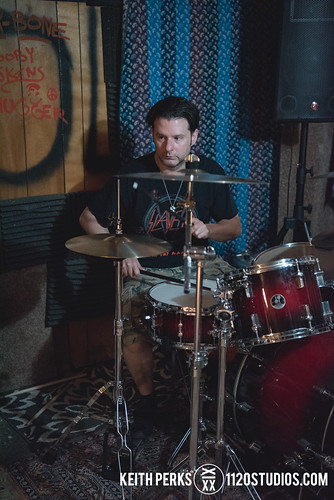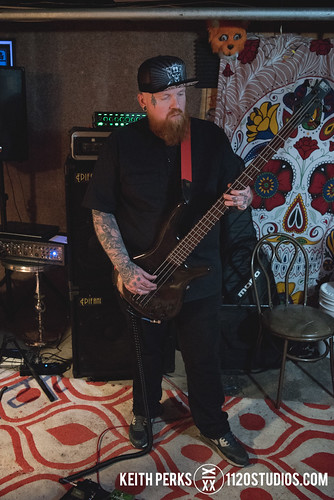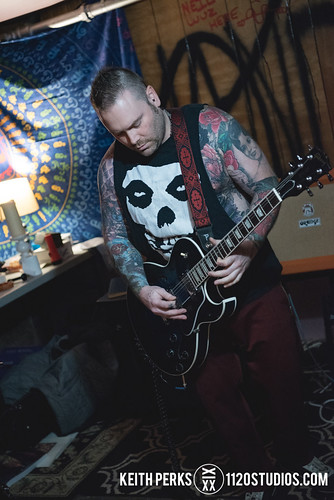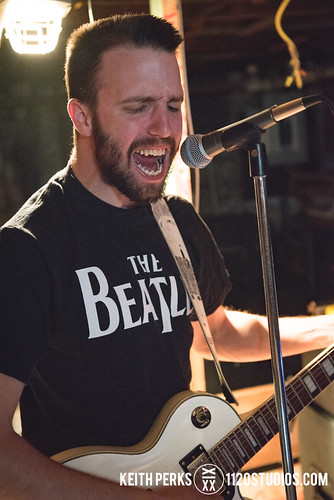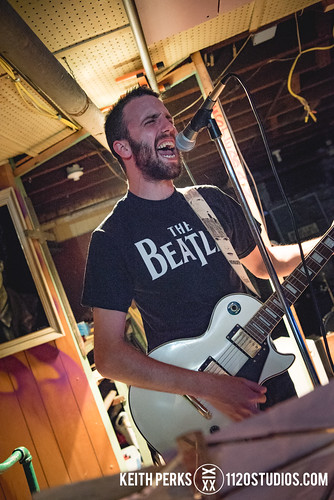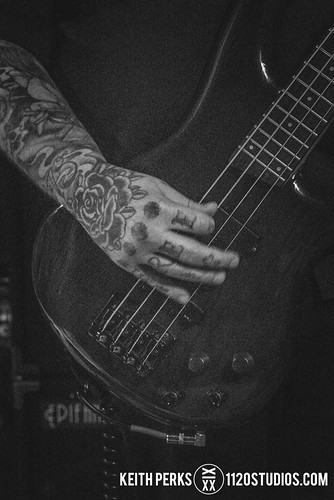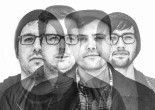While I take photos regularly, it has been a while since I did any writing or interviews, so I wanted to change that. Meet Idol Hands, the “sleaziest” rock band in Scranton. Playing their first show in March and sitting down for their first interview with NEPA Scene soon after, these guys have quickly made a name for themselves with explosive live shows throughout the area and nominations in the Steamtown Music Awards, though they’ll be changing that moniker slightly to These Idol Hands once their new album is released. For now, they’re cooking up some badass tunes in guitarist Chris Notchick’s basement in South Side and getting ready to rock The V-Spot (906 Providence Rd., Scranton) on Saturday, Aug. 18 with Marilyn Manson tribute band Tourniquet, Dead Men, and Kreature.
NEPA SCENE: To start this off, give us brief introductions with a little of your background history and musical experiences. What bands were you in previously?
JAMES SIMON (bass guitar/main songwriter/band manager): I’ve been playing on and off for 20 years. Careers would get in the way, but I’ve been hell-bent for two-and-a-half years now, playing every day in a handful of different projects with different people. I started this band as a little side thing because I had some stuff written that was outside of the scope of the current band that I was in. The Hill You Die On was a collaborative writing process with a lot of great talent, but I wanted something different.
I had a vision of a complete thing. I wanted to take a crack at having control of the concepts, writing of the melodies, lyrics, recording process, imagery, etc., so I found some good friends that played that were agreeable to these terms and were interested in doing this project. None of them really knew each other prior, but it seems to be working out great. We are dysfunctional little family.
JONATHAN RUNCO (lead vocals/rhythm guitar): I’ve been singing my entire life – classical, cover bands, weddings – any way to get better, I’ve been doing it. First original band was Tainted when I was 15. We were young and dumb, mixed covers with originals – still very proud of that old stuff. After that, I was in a cover band for two years, Badash, that was a shit-ton of fun, but it turned into a job. Dealing with basically being a jukebox wasn’t what I wanted, and that’s why that ended.
Then one drunk night at The Keys [in Scranton], Jim asked me to come try out for his new side project. I walked in knowing a cover but said, “Fuck it. Let’s play one you already got written.” Took “Cock of the Walk,” sang it my own way, and I think I did enough for them to ask me back. The rest is what we’re working on now, and it couldn’t be better.
CHRIS NOTCHICK (lead and rhythm guitars/backing vocals): I started playing guitar when I was 6 or so. I didn’t really want to play any instrument at the time, but it was either that or piano, so I chose guitar. I took lessons at Adrian’s Music Shop in Honesdale right next to The Limerick bar. I was really into the L.A. glam scene at the time because Guns N’ Roses and Crüe were all over the radio, and I remember when I learned the intro to “Sweet Child o’ Mine” and thought that was just the coolest thing. My interest waned, though, and I stopped playing for a little bit, but then I heard Pearl Jam and Temple of the Dog. Then Nirvana exploded, and that’s when I started playing again.
I used to play in high school with Glen Clark and Andy Whitiak, but we all played guitar and would just show each other popular songs and whatnot. When I got to college, I played in my dorm room a lot and tried to get in two different bands, but nothing ever solidified. Then I graduated and played “adult” for the last 18 years. I just started playing again last May after my chick and I split after like four years together. About a month or so after plinking along, Jim asked me in the [Loyalty] Barber Shop [where he works] if I wanted to jam on Sunday. That turned into where we are now.
JARETT SCHNESSEL (drums): I’ve been playing on and off for most of life. I’ve played in a few bands here when I was growing up and when I lived in New York City. I liked The Hill You Die On and saw them several times. I saw Idol Hands twice before I joined the band. It all happened when I was getting a haircut at Loyalty, and Jim told me they were looking for a drummer. We decided to give it a try, and it all kinda clicked from there. All our playing styles matched well, and I think the music sounds unique. Since I joined the band a little later, some of the songs were already written, but I tried to put my own spin on them. I did have a hand in the writing process on the new tunes.
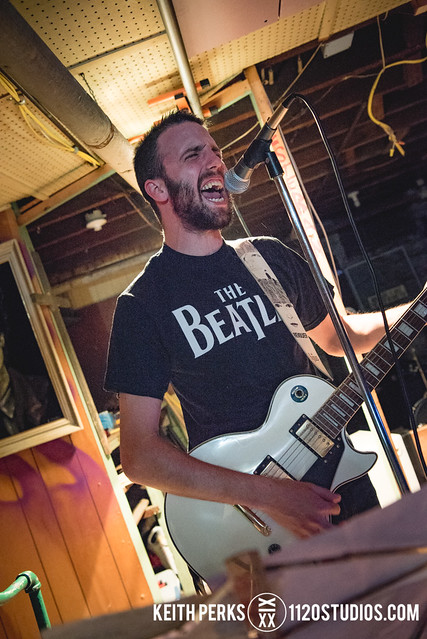 |
NS: Fill us in a little bit on your writing process. Is it a group effort or is there a primary member that takes on lyric and music writing duties? And, if so, in what ways do the other members of the band leave their personal mark within the songs?
SIMON: The protocol has been I write all of the riffs and get a decent arrangement started. I bring it to the band. John will sing some gibberish or silliness just to get the melody that he feels from the song, and I will get a recording of that. Then I will go back and write the lyrics to fit his melodies in the feel or emotion of the song. Every member has the freedom to do what they wish, more or less, when it comes to writing their parts.
So once we have the lyrics and John has written his rhythm guitar parts, whatever drummer we have at the time usually has no problem putting a really great beat to it. Then Chris will work out the lead parts as time goes on. The agreement was that I was going to do this for at least an entire album to realize the vision and see how it goes, but Chris ended up slipping on in there with “Silver Whiskers” and also wrote lyrics in “Drive.” When I heard the riff of the former, I knew that we needed to make that a song. So for that one, he and John actually worked out the lyrics from stuff that Chris had written prior in one of his books of handwritten mania.
RUNCO: The writing process to me is fucking perfect; we keep basically feeding the hot hand. Jim keeps ripping out killer riffs, and he brings them to the band. It takes me a day or two to feel out how I want the melody to flow with the emotion of the song. I get that down for practice and have Jim record me mumbling vowels over it. He takes that and then writes a story… That’s it.
Each one of our songs has a flow and story to it. We make sure each one fits the main vein of our album and the flow is right. We then morph and change each piece together.
NS: Out of what you released so far, your lyrics are fun. You haven’t been tackling politics, the environment, or the separation of families at the border. “Faster, drive faster” is from your second single, “Drive,” that you released on Spotify, and I think it kind of hits the nail on the head of where your mindset is. And it seems to be more lighthearted in topic, but in your face lyrically. Just some good ol’ fashioned rock ‘n’ roll. Is that how you initially pictured the writing to be, or did it evolve into that?
SIMON: Yeah, that was kind of the mantra from the beginning – songs of some primal urges, good and bad. I think art and music of any kind can be really powerful and thought-provoking and when it comes to politics and current struggles that we may be having in this country, but we are not that. Art and music can also be a wonderful escape and vacation from all the heavy things we are dealing with today. We need that just as badly. I mean, the songs can get really heavy and kind of dark in subject matter sometimes, but there is a lot of common thread stitching them all together. A good friend who is a singer/songwriter said that all of the writing comes from a place of speaking on the human condition. I could agree with that. I wouldn’t want an album with 10 “Black Diamonds” on it.
NOTCHICK: When Jim asked if I wanted to jam, I was already really into The Hill You Die On and was very humbled because I knew I wasn’t anywhere near close enough to the caliber of musician he was, let alone the others he was already playing with. We also were kinda just like, feeling each other out too, as people often do when they first start hanging out.
I remember I wanted to try to impress him with stuff I had, so I just started writing riffs that I thought were decent, and I had all this poetry I had written in my journals. Most of it was like, time travel, wizards, cursed houses, real witchy stuff. Then when we got Jon in the band and we were forming what is now “Drive,” Jon stumbled across a poem I had written that was kind of an outward extension of myself in a way, looking back on it.
I remember there’d be nights when I couldn’t sleep and I’d be driving around like at 3-4 in the morning trying to get my head on straight when I knew my chick and I were heading to Splitsville, so those lyrics came about from that… the human condition. It’s something relatable that people can understand that doesn’t have to be rammed down their throats every day; everyone’s experienced some type of loss in their life in some way or other. There’s honesty in it, and that’s what people want nowadays, I feel. So I may be a no good, low down, piece of crap sonofabitch that’s going to die old and alone, but at least there’s a girl out there somewhere that knows this song is about her.
NS: Are there any writers or bands that you pull from for influence when writing songs? Are you currently listening to anything that has been fueling your creative process for your first release?
SIMON: All over the place really. I’m a fan of everything from black metal and doom metal to stoner rock and post-punk. If I could narrow it down to just a few influences, the lyrical influence might even be surprising considering projects I’ve been in. I love Alkaline Trio, and Matt Skiba is one of my favorite lyricists. He is so fucking clever and tricky. And he can slip in some really thought-provoking, heavy, dark subject matter into a song that has the most infectious, addictive, almost downright radio-friendly riffs. Yeah, he’s probably my biggest influence as far as writing lyrics, even though our songs might not reflect that.
As far as the style of music for this band, there are definitely some rock influences we all share, Queens of the Stone Age being one. Interpol another. Definitely a lot of ‘90s stuff, such as Alice in Chains, Nirvana. Tool – a wide range, I’d say. As far as listening to something currently that is influencing the album, not so much. It just kind of comes out from stuff we all have in the bank. I tend to listen to different stuff than the music that I’m working on. I’m not sure why. I’ve been listening to a lot of metal lately, like Slayer, Behemoth, Municipal Waste, and that is definitely not influencing anything we write.
NS: Jim, you were in another band previously called The Hill You Die On. That was a band that was very new to the scene but made a big splash locally. You had a good following from the get-go, but unfortunately it dissolved. After you disbanded, you started to push Idol Hands a little more. At the time, it was very much in the planning stages. Now with several shows under your belt and a great response locally, it’s all kind of mirroring The Hill You Die On. Two different bands, two different sounds, but the same fast-forward momentum. Have you learned anything from your experience with The Hill You Die On that now benefits Idol Hands and its growth, direction, and stability?
SIMON: Well, I wouldn’t say that that’s dissolved. I wouldn’t be surprised if we played a record release show. I do know what you’re saying and how it appears, but it was just one of those things where I think we all got caught up with making some really great music together, but our end goals seemed to be a bit different. At the end of the day, we made a great album that I’m really proud of that is finished; it just needs the blessing in the last push before it is released. It was just intense and I think all of us needed a break from it, and most of us have gone on to do something new.
All of that being said, yes, I absolutely learned a lot from that band. Regardless of whatever we do with it, it’ll always be very special to me because it was a lot of fun shows and music made with some really close friends. I think the biggest thing I took away from that besides the advantage of writing with such great musicians was the importance of playing the tape forward, so to speak, and being very clear on what the goals are of the band and that every individual is on the same page, which is really, really hard, especially when you’re not 20 years old with no responsibilities. But I believe we have that here with Idol Hands. We have had an unreal amount of obstacles that we have successfully navigated through, together, so far.
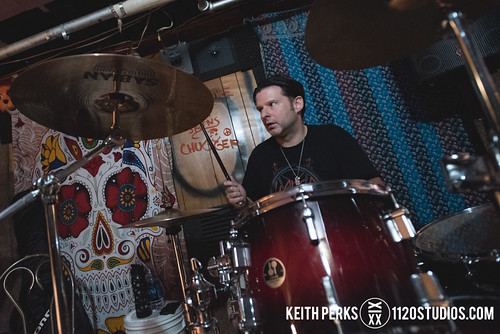 |
NS: You guys formed, practiced and, after a show, lost your drummer to the responsibilities of life. That happens. From what I understand, he was training out of state for work and it naturally complicated things. Bands aren’t always paying full-time gigs when starting out. How do you guys balance your work life and being in a band? How do you juggle day jobs, relationships, and having a schedule full of recordings and shows?
SIMON: Priorities. We make it a fucking priority just like you would your job. That’s what it takes. We have a very challenging schedule here too because we are all on different work schedules and, of course, everyone has a personal life. We sit down with the calendar, we talk about it and point out exactly when we can do what for months in advance. And we are militant about sticking to that schedule, whether it be practices, shows, pre-production, or the recording studio. We treat the budget the same way with investing in the band as well.
And even though it is so rigid, we are also passionate. We love it so much that we look forward to all the hard work we put in, or else we wouldn’t be doing it. And if someone doesn’t feel that way, well, they don’t need to be in the project anymore.
SCHNESSEL: I’m the oldest member of the band, and it is hard at times to do it with responsibilities and work, etc. I will continue to try to keep doing the things that I am passionate about like drums and snowboarding until I can’t anymore.
NS: How did you come across Jarett, and how was it for everyone adjusting to the new guy? Were you strict with drum parts for the already established songs or did you give him room to put his style on everything?
SIMON: I met him from him coming to The Hill You Die On shows with his wife Sue. They are huge music fans and are always at shows in the local scene. Brian Craig, drummer of The Hill You Die On, was playing drums for us at the time to get us through a few shows, and he just needed a break from music, so he didn’t want to commit 100 percent. My friend told me that he saw videos of Jarett playing cover songs on YouTube on the drums. He then happened to come in the Barber Shop the next day and I asked him what was up, and he directed me to some YouTube drum covers he did to get a feel. I watched him play Metallica’s “Blackened” and was like, “What the fuck?” We contacted him immediately and he learned a few of our songs, and that was that.
Sadly, he won’t be our last drummer because with his business ownership and family responsibilities, he cannot go on the road. But he agreed to be with us until whenever and play all these shows this summer and record the album together – and wait until you hear it. He absolutely killed it on drums, and we are thankful to have had him with us and make this album together. As far as moving forward, the machine will not stop. Dave Grohl was Nirvana’s fifth drummer. Sometimes that’s how it goes.
NS: Tell us a little bit about your practice space. How did you settle on this location, and how do you think it fits you?
SIMON: That was a no-brainer. Chris has a two-unit home and one of them has been vacant, and he wanted to make that the practice place, so we’ve been there since the beginning. We had it set up really nice in the upstairs, but the police kept coming for noise complaints, so we had to move it down to the basement and insulate it. It’s been working out great.
NS: How often do you guys practice, and what does a typical practice consist of?
SIMON: We shoot to practice two times a week. Sometimes it only ends up being one, especially if we have a show or recording, which most weekends we do. If it ends up being one of the weeks that we get two in, we get a lot of work done.
And the practices vary depending on what we have on the horizon. We get there on time, and we fucking do work. Whether it’s trying to hash out something for a new song or preparing for a show, it all varies.
NS: You often hear how bands choose a location to write and/or record that will add to the feel of their current album’s style. Radiohead recorded “OK Computer” at a 15th century Tudor mansion where Thom Yorke said, “Ghosts would talk to me while I was asleep.” Nine Inch Nails recorded “Downward Spiral” at 10050 Cielo Drive, where the Manson cult committed the Tate murders. Black Sabbath famously recorded “Sabbath Bloody Sabbath” in Clearwell Castle, a gothic mansion where rehearsals took place in the castle’s dungeon. You may not have access to such places, but how does your practice space add to your process? In what ways does it benefit you and in what ways, if any, does it hold you back?
SIMON: Our practice space is definitely not fancy – far from it. But it works and it works well. When we were practicing upstairs in the house, it was too comfortable and we didn’t even know it. The temperature was nice, and there were couches there we could take a break and drink beers on. It ended up being too much fucking around because it was too easy.
The first time we played in the basement after we were forced to be there, we realized it was much better. There is no comfort. There’s no place to sit. We are there to work, and that’s what we do. If we want to go party or whatever after, that’s fine, but it’s working out really well. Funny thing that sucks is carrying equipment up and down steps. Some of us are not as young as we used to be.
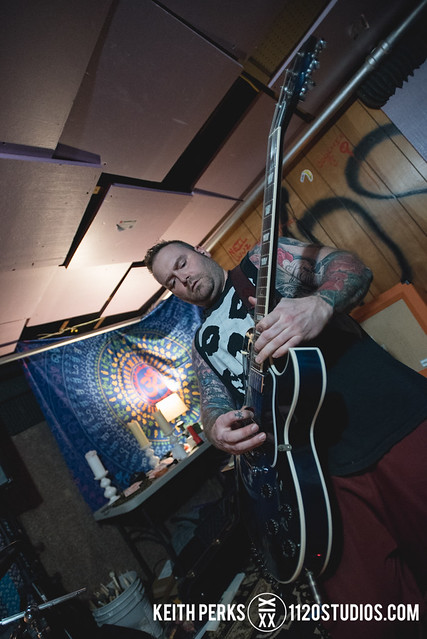 |
NS: You guys are currently in the studio recording with Clyde Rosencrance of Republic Audio Studio based out of Clarks Summit. You had already recorded a couple songs with your old drummer. Are you rerecording anything since you have a new and solid lineup?
SIMON: Yes. All of us are rerecording everything. We have grown quite a bit since then, and we have come up with new versions of the songs. We wanted Jarett to play drums for every song so that there is a consistency throughout the entire album and so it is one coherent body of work that we all completed together.
NS: How has it been working with Clyde? Some audio engineers are there just to record, edit, and mix, but you’ve spoke of him before as a fifth member of the band. In what ways does he contribute to the recordings, and what have you learned from him during this recording process that you didn’t realize or think of before?
SIMON: Clyde is definitely like the fifth member of the band. He just knows his shit. He’s a fountain of information. It would be downright silly to not utilize that. He’s an excellent musician with a great ear, and we really share some passions for the same exact music. He had been a friend and customer of mine for years prior, and we have grown close over the last year working on this music together. It doesn’t hurt that he has a fucking amazing studio with top-of-the-line equipment that puts out some pretty amazing records. When I heard Black Hole Heart’s “View from the Floor” EP, I knew I wanted to work with him. He’s perfect for us. It’s to the point where he comes to our practices intermittently to check out what we have going on, and we drain him for any input that he might have.
Before this last recording session, I made him strap a guitar on and we jammed out for a little while because I was getting hung up on something and I wanted to bounce it off of him. Let’s say he got me un-hung up, and I’m really happy with the result. That’s the funny thing about this band. Everyone that becomes involved with us becomes like another leg of this giant monster because it’s like a family. They are passionate about their role in it too, and that makes me happy.
NS: Being a new band, there’s a growth process where bands find their style and develop from experiences from recording and playing live with each other. Looking back over the last few months, what have you seen change, and what things do you see currently that you’d like to develop more or even rethink?
SIMON: We are inevitably evolving, but I feel it’s at the perfect rate. If you listen to the first song we wrote and then the last song we wrote, there still continuity there and there are fibers that make them feel like they are from the same album, and that’s important to me. There are only a few songs that didn’t make the cut when we trimmed the fat.
NS. When seeing a new band play, it can be frustrating to see a live performance. I often see members play with backs to the crowd because of nerves. Performance is crucial. You need to connect with fans, especially during a live performance. Being less than a year old, there seems to be a comfort within the band on and off the stage. What do you attribute that to?
SIMON: There is a comfort. And I attribute that to the closeness between us. I’ve been friends with Jon for a long time; I was friends with our original drummer, Rob, for a long time as well. I’ve been friends with Chris for a few years, but we have a relationship where nobody walks on eggshells and we say exactly what we mean – we argue, we curse, we fight when it needs to happen, and I wouldn’t have it any other way. Jarett is relatively new, so a lot of times he just watches this happen, but I think he’s getting used to it by now. Thankfully, he’s pretty easy to get along with, and he’s so talented that we don’t really have to have a lot of input on the percussion side of things.
All of that being said, it’s like we really are brothers, not just saying that. We have each other’s backs, and there’s an energy that passes among us that is very real. We all feel it when we play together, and it’s awesome.
NS: I’m always surprised by bands and what they listen to compared to the style of music they play. I was watching an Avett Brothers documentary recently, and it reminded me of their love of bands like Nirvana. What might we be surprised with that’s in your album collection?
SIMON: I already know Jon will be the most shocking answer here. I don’t think anything I listen to it would be shocking at all. I listen to rock and metal mostly. Little bit of old country sometimes. Maybe it would be a surprise to know that one of my favorite bands is Deer Tick, which I guess would be considered alt-country, maybe. I don’t know.
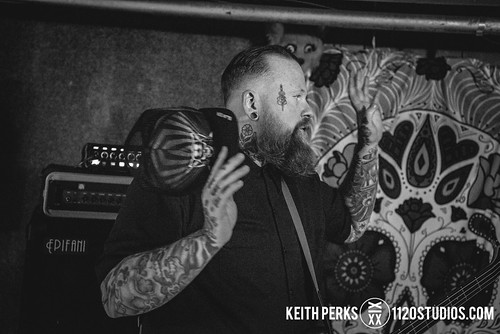 |
NS: Tell us about your upcoming album. How many tracks will there be, and when can we look forward to a release?
SIMON: There will be seven tracks. It will be out by late September, with a record release show somewhere around there. We also have a very special surprise in store regarding the release of the actual album that you will be able to purchase. There will be a physical release available, which will also get you a download card.
NS: How have you seen the industry change over the last few years, and how does that affect your decisions in producing and releasing music?
SIMON: Well, I grew up on albums, recognizing an album as an entire piece of art, a body of work that is all supposed to go together, with the sequence mattering and the album art and the liner notes and the actual physical art that you purchase at the store when it comes out. All of the albums I grew up on, when I hear a certain song, I automatically hear the next track coming up in my head. I used to get my paycheck and go sifting through the new releases at Gallery of Sound and then go looking through some old stuff and maybe even used stuff for some treasures. I mean, I ended up getting on the vinyl kick, too, but it’s just not the same as it used to be because everybody is so focused on the digital release for all of the obvious reasons. This is the future.
Now, that also changes the way that we consume music. I think our attention spans are shorter, and we dick around just because it’s so fucking easy to listen to new music, you don’t have anything invested. You know, you used to take a chance on an album. Now with Spotify and everything, there’s no reason to give it a chance if you don’t instantly love it right away or whatever. Some of my favorite albums I didn’t love as soon as I heard them, and maybe I wouldn’t have given them a chance if I didn’t spend my hard-earned money on it. Just maybe. So, inevitably, I feel like that changes the way that we release music.
I mean, I don’t profess to know shit about any of this, but I think an efficient way to release music today will probably be in EP form, three songs at a time. It’s enough to get a feel for the band and what they are doing because it’s not just a snapshot of one song, but it’s also not 12 tracks. Three or four tracks leaves you wanting more. 10 or 12 might not get the attention they deserve. Not to mention, it’s more cost-efficient and the band can kind of just experiment more without committing to this huge project and expense. Not to mention more frequency of releases and shows and things to be excited about.
Why is our album seven tracks? I don’t really know. I guess it’s somewhere in between, and it’s definitely a cohesive piece of work.
NS: You have a pretty solid show schedule for this summer. Are there any plans to take the band on the road and do some weekend-style tours out of the area?
SIMON: We are working out a schedule right now to hit the road in October for a few weeks with a string of some shows along the East Coast.
NS: What are the positives and negatives of playing in the NEPA music scene? What would you like to see changed, if anything?
SIMON: The positives are the fact that there is a wealth of talent in the local scene. We are fortunate to have numerous venues that are down for having original music on the regular. It was not that way when I started playing music. Good luck going to a packed bar and making any money playing your originals on Saturday night. That was for cover bands mostly. We are lucky to be able to do what we do, whether everyone knows that or not, I don’t know. Some people can always find something to bitch about no matter how good things are.
What I would like to see change is having a venue like Tink’s again. I think a lot of us thought that’s what The Leonard [in Scranton] was going to be. Wouldn’t it be great to have like a 1,000-person venue with a box office where a lot of our favorite bands would play, and a lot of us would have opportunities to play with them? Maybe someday it will happen again.
NS: What’s one thing you’d like to fill fans of Idol Hands, soon to be These Idol Hands, in on that they may not already know?
SIMON: That Chris and John are dating.
See NEPA Scene’s photos of Idol Hands performing at the Border Bar in Pittston in June here and at The Bog in Scranton in April here.
by Keith Perks
Keith is an artist, photographer, and writer. He loves diners, dive bars, Southern culture, anything Irish, and vintage America. He knows Cytoxan kicks in after about eight hours and he once helped save a green pig.

